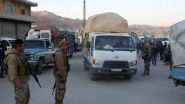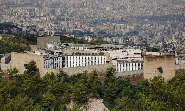
Lebanon and Syria have set up bilateral committees to address sensitive issues: Lebanese citizens missing in Syria, Syrian prisoners held in Lebanon, and the demarcation of their shared border. Announced on September 1, 2025, this initiative is a turning point in relations long marked by tension.
The two countries unveiled the creation of joint committees tasked with handling three key files: Lebanese citizens who went missing in Syria, Syrian prisoners currently held in Lebanon, and formal delineation of the common border. The announcement was made on September 1, 2025, during a visit to Beirut by a Syrian delegation composed of former ministers and the head of Syria’s National Commission for the Missing.
The Lebanese Missing: A Wound Still Open
The fate of Lebanese who disappeared in Syria remains one of the most painful scars of the country’s recent history. During the Lebanese Civil War (1975–1990) and the Syrian occupation (1976–2005), thousands of Lebanese were abducted or jailed, often without trial or any information about their fate. According to NGO SOLIDE, around 650 Lebanese are still missing in Syria. Families, organized through groups such as the Committee of the Families of Kidnapped and Missing in Lebanon, have tirelessly demanded answers. While a handful of releases have taken place in recent years, many cases remain unresolved.
The creation of the bilateral committee offers a fragile glimmer of hope, with a mandate to investigate disappearances, review Syrian prison archives, question former officials, and coordinate with families. DNA testing is also being considered to help identify recovered remains.
Amid persistent criticism from families over a lack of transparency and political will, the Lebanese government insists that the issue has been central in discussions with Damascus. Beirut says it acknowledges the families’ suffering and right to the truth, and pledges to exert all efforts to secure the return of those who may still be alive on Syrian territory, according to several sources.
The Syrian Perspective
On the Syrian side, about 2,000 nationals are currently held in Lebanon, nearly 800 of them on security-related charges. The matter gained new momentum with the recent visit of a Lebanese security and judicial delegation to Damascus, which local media sources described as an important milestone in the talks.
The discussions focus primarily on two priorities: addressing the fate of Islamist detainees arrested during the Dennieh clashes (2000) and the Nahr al-Bared conflict (2007), and clarifying the legal framework for extraditions in light of existing bilateral agreements.
Syria is seeking the repatriation of prisoners identified as opponents of the former regime, while Lebanon refuses to extradite those implicated in the killing of Lebanese soldiers or in political assassinations. According to Lebanese authorities, serious crimes such as murder and terrorism will be excluded from extradition; only other categories of offenses will be reviewed progressively. An official prisoner list is expected to be submitted soon by the Syrian side at the committees’ second meeting in Beirut.
The Common Border
The second committee will undertake the technical work of formally demarcating the Lebanon-Syria border, which remains only partially defined; a situation that has fueled smuggling, informal land occupation, and local tensions. It will also propose measures to strengthen border security while safeguarding the interests of local communities.
The launch of these committees comes at a politically unprecedented moment, following the fall of Bashar al-Assad’s regime and the rise to power of interim president Ahmad al-Sharaa, who has pledged to turn a new leaf with Beirut.
Should these bilateral bodies achieve tangible results, they could mark a significant step toward the normalization of relations between Lebanon and Syria, and even serve as a model for resolving other regional disputes. Yet, daunting challenges remain; chief among them transparency, respect for human rights, and effective implementation of decisions.




Comments